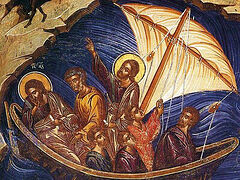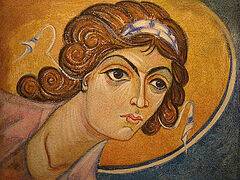Part 1. Lord, Thou Hast Been our Protection in All Generations
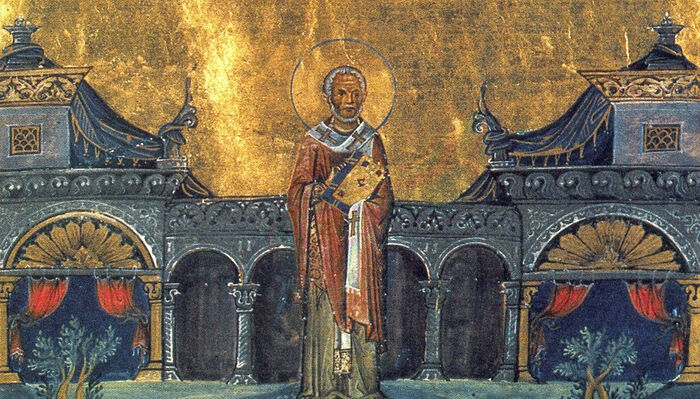 St. Gregory of Neocaesarea. Photo: 40ms.ru
St. Gregory of Neocaesarea. Photo: 40ms.ru
God’s protection
When the persecution of Christians began in the reign of the impious Emperor Decius, a royal command was issued to force Christians everywhere to worship idols, and to torture and destroy any who disobeyed. Therefore, St. Gregory of Neocaesarea advised his flock to go into hiding in case anyone was too weak or did not possess the gift of God to withstand the terrible torments. This way, no one who might at first boldly give himself over to the torturers but later become frightened at the sight of the terrible tortures, unable to bear anything of this kind, might fall away from God.
“It is better,” said Gregory, “to take refuge for a short time and wait for God to summon you, and then He will provide help to undergo the feat of martyrdom.”
Giving such counsel to the faithful, he took one of his deacons, withdrew into the desert and hid there from the infidels. The torturers dispatched by the king arrived to the city of Neocaesarea, searching first for Gregory as the main representative of all Christians and the shepherd of the sheep of the Word in that country.
Some of the infidels, having learned that he was hiding inside a certain mountain, notified the soldiers and brought them to that mountain. They quickly moved up the mountain like dogs chasing prey on a hunt or like wolves seeking to snatch a sheep.
Seeing that the soldiers were approaching and it was impossible to flee or hide from them, St. Gregory lifted his hands up to heaven, entrusting himself to the protection of God, and commanded his deacon to do the same. Both stood there in this way, with their hands raised, praying. Meanwhile the soldiers kept searching diligently all over the mountain for the saint but they couldn’t find him. They simply couldn’t see him, despite having passed right next to him several times. After many searches they returned without success, and as they were coming down the mountain they told the one who had led them there, “We found no one on this mountain and all that we saw were two trees standing not far from one another.”
That man, realizing that they had witnessed a miracle, left them and went up the mountain himself. Having found the saint and the deacon standing in prayer, he prostrated himself before Gregory and expressed the desire to become a Christian; and his wish was granted. Thus, having been a persecutor he became a servant of Christ, and joined other Christians in hiding.1
Protection of the Mother of God
Once there lived in Alexandria a certain truly Christ-loving, God-fearing and compassionate man who was known for his hospitality to monks. He had a truly humble wife, who observed every fasting period, and a daughter, about six years old. One day, this Christ-loving man went to Constantinople, for he was a merchant. And so, leaving his wife, daughter, and one slave in the house, he went to the harbor.
Before he left to board the ship, his wife said, “To whom do you entrust us, my lord?” The husband answered: “To our Lady the Mother of God.”
One day, when his wife was sitting over her work with their girl next to her, the servant, at the urging of the devil, decided to kill the woman and the girl, steal their possessions, and run away. Taking the knife from the kitchen, he went inside the dining room where his mistress was sitting. As soon as the slave reached the door of the dining room he was stricken with blindness, and could not make it to the dining room or the kitchen. He tried to force himself with blows for an hour in order to move and then, at last, he began to call loudly for his mistress, “Come here.”
She was surprised that the slave, instead of coming to see her, was standing in the doorway yelling and so she told him, “Come here yourself,” not knowing that he had gone blind. The slave began to exhort her to come to him, but she said that she wouldn’t. Then the slave told her, “Send your girl to help me at least!” She didn’t do this either and replied: “If you want, come here yourself!”
Then the slave, who was truly helpless, stabbed himself with the knife and collapsed in a heap. His mistress, seeing what had happened, raised a clamor. The neighbors came running, and soon the people came from the praetorium; They found the slave still alive, learned everything from him, and praised the Lord Who had worked the miracle and saved the mother and her child.2
The heavenly sentinel
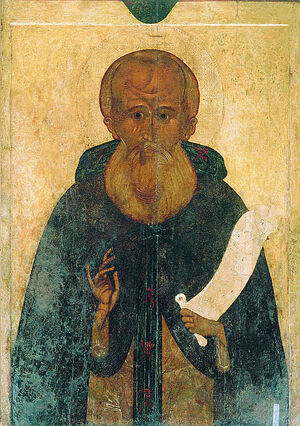 Venerable Cyril of White Lake The Venerable Cyril of White Lake was born in Moscow of pious parents. He became a monk in the Simonov monastery. His ascetic labors won him the respect of the whole brotherhood and he was distinguished by St. Sergius, the father of the monastics. In 1390, the brethren of the Simonov monastery begged Monk Cyril to be their abbot.
Venerable Cyril of White Lake The Venerable Cyril of White Lake was born in Moscow of pious parents. He became a monk in the Simonov monastery. His ascetic labors won him the respect of the whole brotherhood and he was distinguished by St. Sergius, the father of the monastics. In 1390, the brethren of the Simonov monastery begged Monk Cyril to be their abbot.
The numerous and noble visitors who came to the abbot for instruction and blessing greatly disturbed St. Cyril, who shunned worldly glory, and so he soon gave up the dignity of abbot and began the ascetic life as a simple monk.
Seeking complete solitude and silence, St. Cyril, at the miraculous direction of the Mother of God, withdrew to the shores of White Lake (Vologda region), and settling in a remote forest area, he began to lead the life of a hermit. But those zealous for the life of silence flocked to him there, and the holy elder realized that the time of his silence was over. <...>
As the robbers came closer to the monastery, they saw a multitude of men shooting bows and arrows. The next night, the vision occurred again
When the rumor spread that Archimandrite Cyril was sent from Moscow to found a monastery in the woods, it occurred to the boyar Feodor that the Archimandrite must have brought a lot of money with him. So, he sent his servants to rob Cyril. When they approached the monastery, they saw a multitude of men shooting bows and arrows, and so they waited a long time for them to leave. At last, they themselves left, causing no harm to anyone. The next night the robbers saw the same vision, and even more warriors were shown to them near the monastery. Fearing for their lives, they ran to tell the boyar who had sent them.
Feodor was dumbfounded by this news, and assuming some nobleman had come to see St. Cyril, he sent someone to the monastery to find out who that visitor was.
He was told that the monastery hadn’t had any visitors for over a week. It was then that Feodor came to his senses and realized that God Himself was sending angels to protect His saint. Fearing that the judgment of the Lord would befall him, he immediately went to St. Cyril and tearfully confessed his sin. The holy abbot gave thanks to God Who saves those who place their hope in Him, and said, “Rest assured, my son Feodor, that I have nothing but the clothes you see on me and a few books. As for money for the monastery, we get them from the One Who keeps it safe.”
From that time on the boyar reverently venerated St. Cyril, and every time he visited the saint he would bring him fish or something else.3
A vigilant intercessor
From the memoirs of Anatoly Pavlovich Timofeevich
“It happened in the early years of the revolution. The three of us were sitting on the veranda of the abbot’s quarters at the Holy Trinity Monastery in Kiev—the famous spiritual writer S. A. Nilus, Prince V. D. Zhevakhov (brother of the former companion of the Chief Procurator of the Holy Synod) and I. <...>
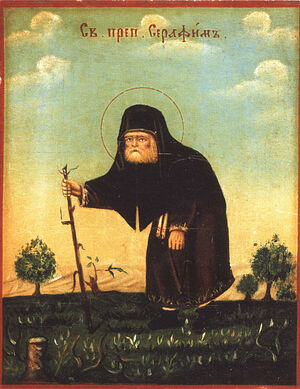 St. Seraphim of Sarov Father Abbot asked S. A. to tell a few stories about grace-filled help through the prayers of St. Seraphim [of Sarov] that he had witnessed.
St. Seraphim of Sarov Father Abbot asked S. A. to tell a few stories about grace-filled help through the prayers of St. Seraphim [of Sarov] that he had witnessed.
“What could be better,” replied S. A., “than to share this here among you, my friends, and I will gladly tell you a few wondrous signs of this God-pleasing saint that happened to me, a sinner, in recent years.
When I was still living on the estate of Prince Vladimir Davidovich, when the neighboring landowners’ estates were already being destroyed all around and the banditry of soldiers returning from the front had reached its peak, my wife and I were going though troubled times. Our only hope was in God and Batiushka Fr. Seraphim.
My wife and I read the Akathist to him daily in front of his large icon, followed by the Paraklesis to the Queen of Heaven according to the Diveyevo rule. Days passed, but we were still being left alone—except for the time when my wife and I were on the way back from church on a Sunday afternoon and a peasant caught up with us, out of breath:
“Your honor! Hey, your honor! Just wait for a minute, I need to tell you something. Listen to me: Go away, for God’s sake, from this area, because we are afraid that we won’t be able keep you safe.”
Surprised by this revelation, I began to ask him why he was thinking this way.
An old man would come out of your gate a few times threatening our guys with a stick, and this had left them so overcome with fear that they couldn’t even take a step
“How else, when our guys, I must admit, had long planned to kill you; they even waited in ambush next to your house for night to come. But then an old man, he must be your watchman, would come out of your gate threatening our guys with a stick, leaving them so overcome with fear they couldn’t even take a single step. So, they realized that all this was for some reason. Fearing trouble, we decided not to touch you for some time to come, but now we’ve had enough. The neighboring villagers pester us, saying that we protect the landlords. We’re afraid that we won’t be able to hold them off, so you just kinda do us a favor—go somewhere far away.”
Astonished by his story, I thanked him for the advice, knowing full well who has been our protector and rescuer from certain death. My wife and I took the peasant’s words as an order from above and quietly began preparing for our departure.4


